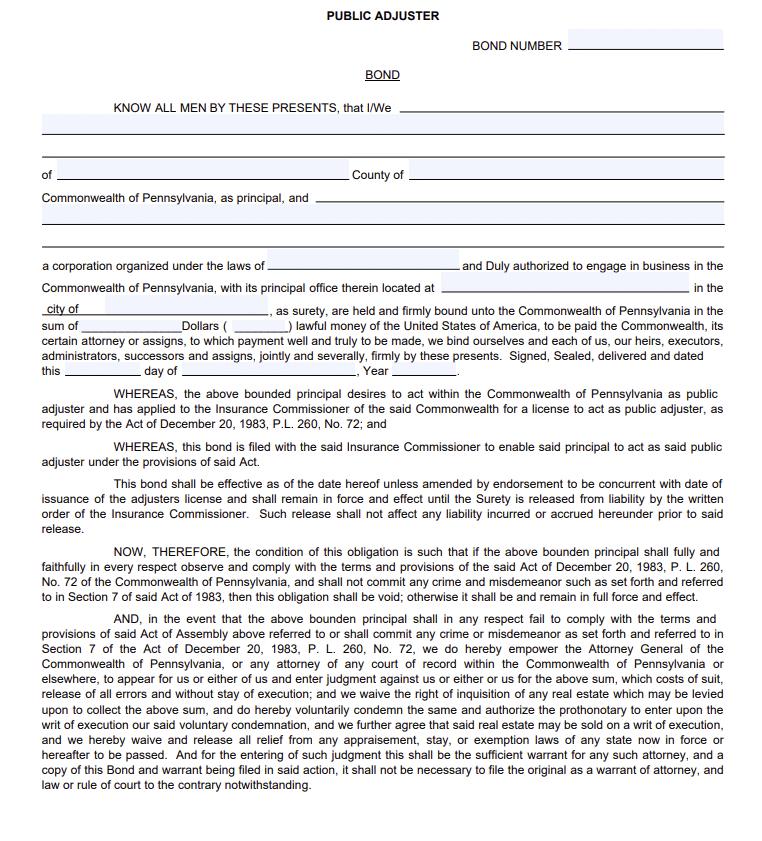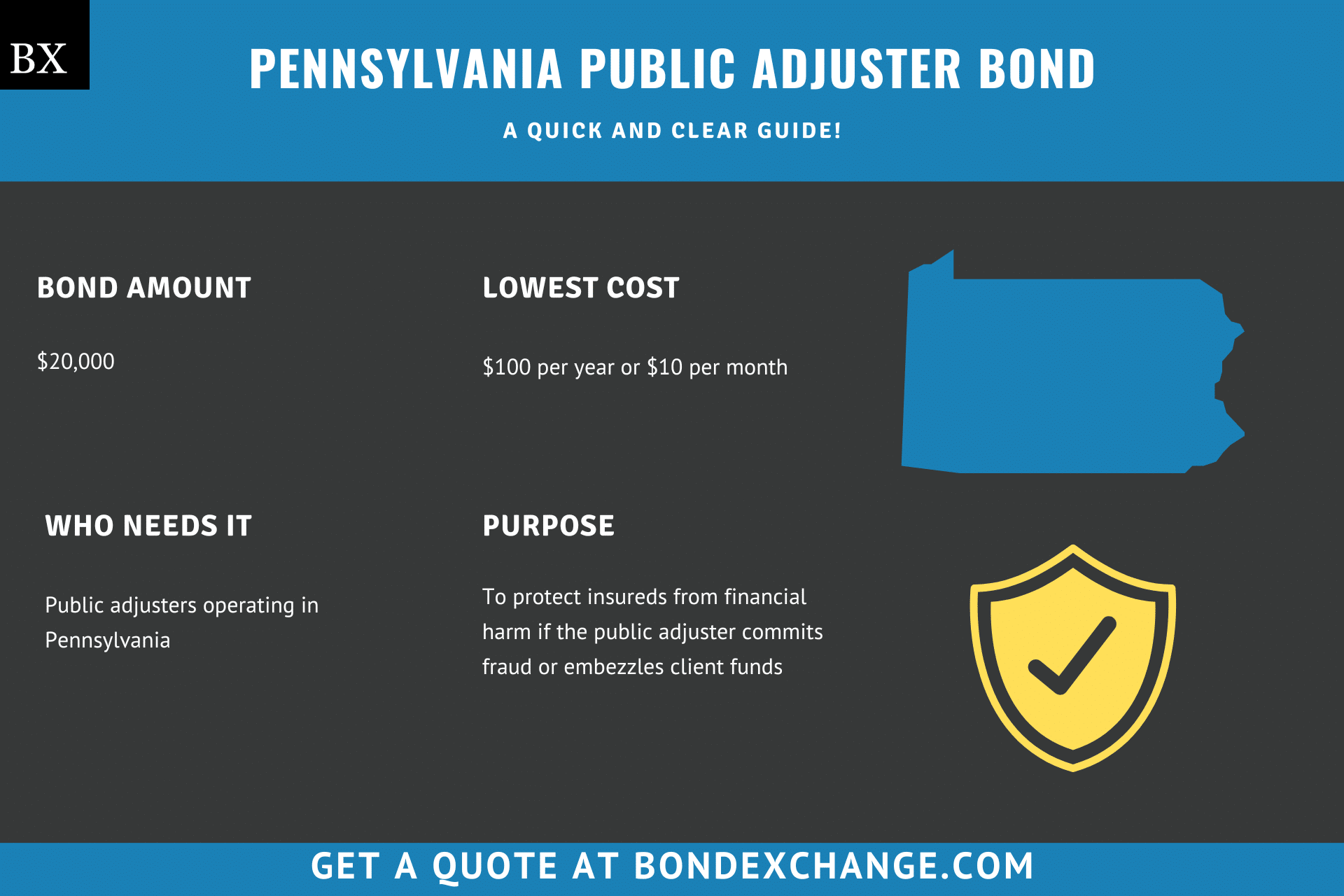Pennsylvania Public Adjuster Bond: A Comprehensive Guide
This guide provides information for insurance agents to help their customers obtain a Pennsylvania Public Adjuster bond.
At a Glance:
- Lowest Cost: $100 per year or $10 per month
- Bond Amount: $20,000
- Who Needs It: All public adjusters operating in Pennsylvania
- Purpose: To protect insureds from financial harm if the public adjuster commits fraud or embezzles client funds
- Who Regulates Public Adjusters in Pennsylvania: The Pennsylvania Insurance Department

Background
Pennsylvania law requires public adjusters operating in the state to obtain a license from the Insurance Department. The Pennsylvania legislature enacted the licensing requirement to ensure that public adjusters do not engage in unethical business practices. To provide financial security for the enforcement of the licensing law, public adjusters must purchase and maintain a $20,000 surety bond to be eligible for licensure.
What Is the Purpose of the Pennsylvania Public Adjuster Bond?
Pennsylvania requires public adjusters to purchase a surety bond as part of the application process to obtain a license. The bond ensures that insureds will receive compensation for financial harm if the public adjuster fails to abide by the regulations outlined in Pennsylvania 1983 Act 72. Specifically, the bond protects insureds if the public adjuster commits fraud or embezzles client funds. In short, the bond is a type of insurance that protects insureds if the public adjuster violates the terms of their license.
How Can an Insurance Agent Obtain a Pennsylvania Public Adjuster Surety Bond?
BondExchange makes obtaining a Pennsylvania Public Adjuster bond easy. Simply log in to your account and use our keyword search to find the “public adjuster” bond in our database. Don’t have a login? Gain access now and let us help you satisfy your customers’ needs. Our friendly underwriting staff is available by phone at (800) 438-1162, email, or chat from 7:30 AM to 7:00 PM EST to assist you.
At BondExchange, our 40 years of experience, leading technology, and access to markets ensures that we have the knowledge and resources to provide your clients with fast and friendly service whether obtaining quotes or issuing bonds.
Not an agent? Then let us pair you with one!
Click the above image to find a BX Agent near you
Is a Credit Check Required for the Pennsylvania Public Adjuster Bond?
Surety companies will run a credit check on the public adjuster to determine eligibility and pricing for the Pennsylvania Public Adjuster bond. Adjusters with excellent credit and work experience can expect to receive the best rates. Adjusters with poor credit may be declined by some surety companies or pay higher rates. The credit check is a “soft hit”, meaning that the credit check will not affect the adjuster’s credit.
How Much Does the Pennsylvania Public Adjuster Bond Cost?
The Pennsylvania Public Adjuster surety bond can cost anywhere between $100 to $800 per year or $10 to $80 per month. Insurance companies determine the rate based on a number of factors including your customer’s credit score and experience. The chart below offers a quick reference for the approximate bond cost on the $20,000 bond requirement.
$20,000 Public Adjuster Bond Cost
| Credit Score* | Bond Cost (1 Year) | Bond Cost (1 month) |
|---|---|---|
| 720+ | $100 | $10 |
| 680 – 719 | $150 | $15 |
| 600 – 679 | $200 | $20 |
| 575 – 599 | $250 | $25 |
| 550 – 574 | $300 | $30 |
| 500 – 549 | $800 | $80 |
Who Is Required to Purchase the Pennsylvania Public Adjuster Bond?
Pennsylvania requires public adjusters to purchase a surety bond as a prerequisite to obtaining a professional license. To paraphrase Pennsylvania 1983 Act 72, a public adjuster is a person that acts on behalf of or aids insureds in negotiating the settlement of insurance claims.
Exemptions to this definition include:
- Representatives of an insurance company, association, or exchange that wrote the policy in question
- Insurance producers providing the same services as a public adjuster without additional compensation

BondExchange now offers monthly pay-as-you-go subscriptions for surety bonds. Your customers are able to purchase their bonds on a monthly basis and cancel them anytime. Learn more here.
How Do Public Adjusters Become Licensed in Pennsylvania?
Public adjusters in Pennsylvania must navigate several steps to obtain a license. Below are the general guidelines, but applicants should refer to the licensing statutes and the state’s licensing page (click here for licensing information for business entities) for details on the process.
License Period – All Pennsylvania Public Adjuster Licenses are valid for two years and must be renewed before the expiration date. The expiration date for licensed individuals will be the last day of their birth month, and the expiration date for licensed businesses will be on the date of issuance.
Step 1 – Pass the Exam
Pennsylvania requires public adjusters to pass a state exam before applying for a license. The exam is administered through PSI Services LLC, and adjusters can register for the exam here.
Non-resident public adjusters are exempt from the exam requirement.
Step 2 – Complete the Application
After passing the exam, public adjusters should apply for a license online through either Sircon or the NIPR. A $200 application fee is required. Public adjusters that are unable to apply online may submit a paper application (click here for resident and here for non-resident), including a cover letter explaining why they cannot apply online, to the following address:
COMMONWEALTH OF PENNSYLVANIA
INSURANCE DEPARTMENT
BUREAU OF LICENSING AND ENFORCEMENT
1209 Strawberry Square
Harrisburg, PA 17120
Public adjusters that do not wish to use the state’s sample contract must submit one for approval from the Department of Insurance.
Step 3 – Get Fingerprinted
All resident public adjusters must get printed before receiving their license. To get their fingerprints taken, public adjusters should register with IdentoGo online here and enter the Insurance Department’s service code, which is 1KGBGJ. IdentoGo will provide the adjuster with a registration number that they must use when they go on-site to get their fingerprints taken.
Step 4 – Purchase a Surety Bond
Public adjusters must purchase and maintain a $20,000 surety bond.
How Do Pennsylvania Public Adjusters Renew Their Licenses?
Public adjusters should renew their licenses online through either Sircon or the NIPR. Public adjusters must pay a $200 renewal fee and complete 24 hours of continuing education each renewal period.
What Are the Insurance Requirements for Public Adjusters in Pennsylvania?
Pennsylvania does not require public adjusters to purchase any form of liability insurance as a prerequisite to obtaining a license. Public adjusters must purchase and maintain a $20,000 surety bond.
How Do Pennsylvania Public Adjusters File Their Bonds?
Public adjusters in Pennsylvania should email their completed bond forms, including the power of attorney, to [email protected]. The surety bond requires signatures from the surety company and the public adjuster. The surety company should include the following information on the bond form:
- Legal name and address of the individual buying the bond
- Surety company’s name, state of incorporation, and address
- Bond amount
- Date the bond is signed
What Can Pennsylvania Public Adjusters Do to Avoid Claims Made Against Their Bonds?
To avoid claims against their bonds, public adjusters in Pennsylvania must follow all license regulations in the state, including some of the most important issues below that tend to cause claims:
- Do not commit fraud
- Do not embezzle funds owed to a client
For example, if a public adjuster does not provide a client with all claims funds owed to them, the client could file a claim against the adjuster’s bond to recoup their losses.
What Other Insurance Products Can Agents Offer Public Adjusters in Pennsylvania?
Most reputable public adjusters will purchase business liability insurance. Bonds are our only business at BondExchange, so we do not issue any other types of insurance, but our agents often utilize brokers for this specific line of business. A list of brokers in this space can be found here.
How Can Insurance Agents Prospect for Pennsylvania Public Adjusters?
Pennsylvania provides a public database to search for active public adjusters in the state. Contact BondExchange for additional marketing resources. Agents can also leverage our print-mail relationships for discounted mailing services.

